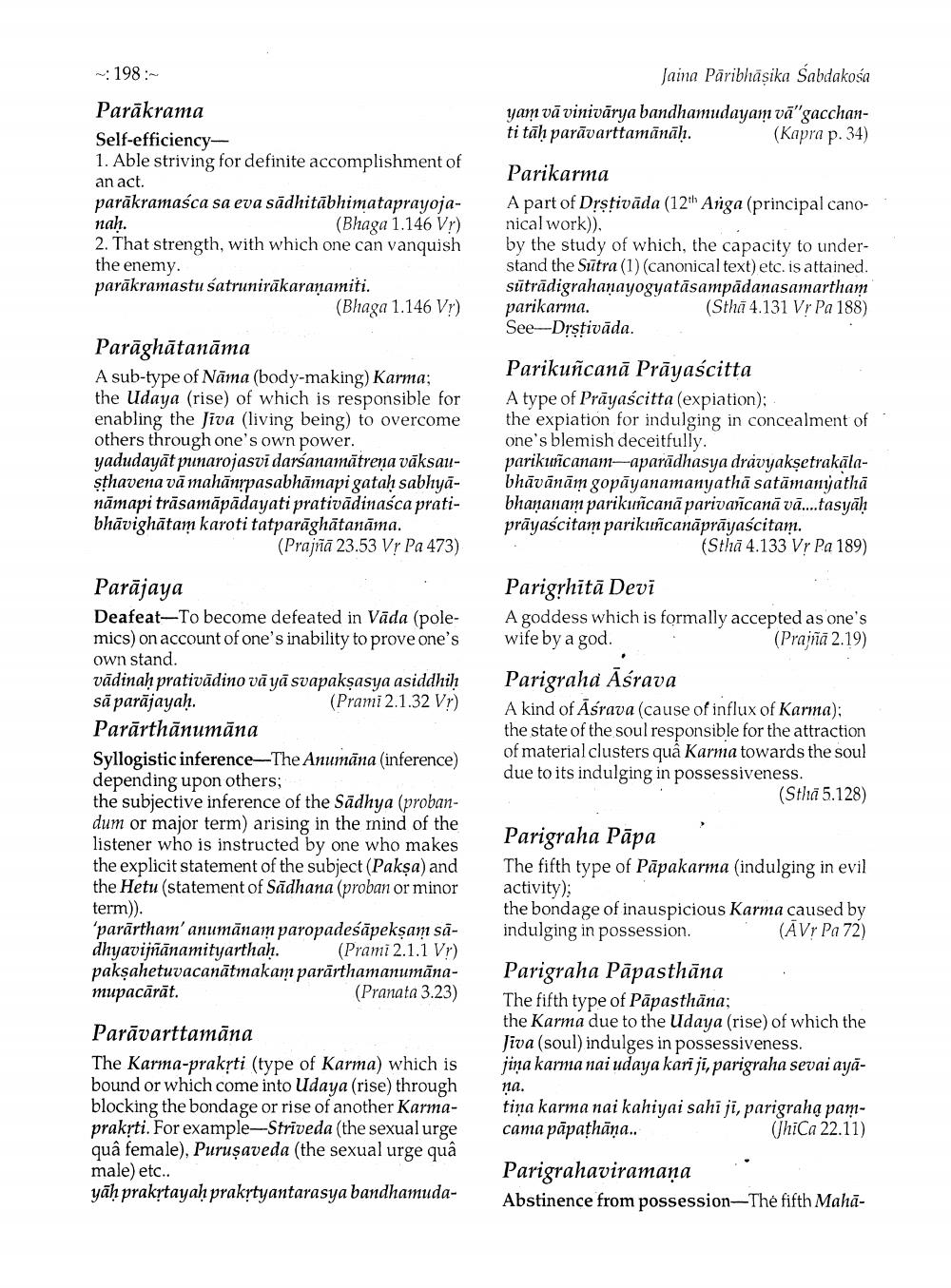________________
198:
Jaina Pāribhāşika Sabdakosa yam vā vinivārya bandhamudayam vā"gacchanti tāh parāvarttamānāh.
(Kapra p. 34)
Parākrama Self-efficiency, 1. Able striving for definite accomplishment of an act. parākramasca sa eva sādhitābhimataprayojanah.
(Bhaga 1.146 Vr) 2. That strength, with which one can vanquish the enemy. parākramastu satrunirākaranamiti.
(Bhaga 1.146 Vr)
Parikarma A part of Drstivāda (12th Ariga (principal canonical work)). by the study of which, the capacity to understand the Sūtra (1) (canonical text) etc. is attained. sütrādigrahaņayogyatāsampādanasamartham parikarma.
(Stha 4.131 Vr Pa 188) See-Drstivāda.
Parāghātanāma A sub-type of Nāma (body-making) Karma; the Udaya (rise) of which is responsible for enabling the Jiva (living being) to overcome others through one's own power. yadudayāt punarojasvi darsanamätrena vāksausthavena vā mahānrpasabhāmapi gatah sabhyanāmapi trāsamāpādayati prativādinasca pratibhāvighātam karoti tatparāghātanāma.
(Prajñā 23.53 V? Pa 473)
Parikuñcanā Prāyascitta A type of Prāyascitta (expiation); the expiation for indulging in concealment of one's blemish deceitfully. parikuñcanam-aparādhasya drávyakşetrakālabhāvānām gopāyanamanyathā satāmanijathā bhananam parikuñcanā parivañcanā vā....tasyāḥ prāyascitam parikuñcanāprāyaścitam.
(Stha 4.133 Vr Pa 189)
Parigrhitā Devi A goddess which is formally accepted as one's wife by a god.
(Prama 2.19)
Parājaya Deafeat-To become defeated in Vāda (polemics) on account of one's inability to prove one's own stand. vādinah prativādino vāyā svapakşasya asiddhih sā parājayah.
(Prami 2.1.32 Vr) Parārthānumāna Syllogistic inference-The Anumāna (inference) depending upon others; the subjective inference of the Sadhya (probandum or major term) arising in the mind of the listener who is instructed by one who makes the explicit statement of the subject (Pakşa) and the Hetu (statement of Sādhana (proban or minor term)). 'parārtham' anumānam paropadeśāpekşam sadhyavimānamityarthah. (Prami 2.1.1 Vr) pakşahetuvacanātmakam parārthamanumānamupacārāt.
(Pranata 3.23)
Parigrahd Asrava A kind of Āśrava (cause of influx of Karma); the state of the soul responsible for the attraction of material clusters quâ Karma towards the soul due to its indulging in possessiveness.
(Stha 5.128)
Parigraha Pāpa The fifth type of Pāpakarma (indulging in evil activity); the bondage of inauspicious Karma caused by indulging in possession.
(AVr Pa 72)
Parigraha Pāpasthāna The fifth type of Pāpasthāna; the Karma due to the Udaya (rise) of which the Jiva (soul) indulges in possessiveness. jina karma nai udaya kariji, parigraha sevai aya
па.
Parāvarttamāna The Karma-prakyti (type of Karma) which is bound or which come into Udaya (rise) through blocking the bondage or rise of another Karmaprakyti. For example-Strīveda (the sexual urge quâ female), Puruşaveda (the sexual urge quâ male) etc.. yāḥ prakrtayah prakrtyantarasya bandhamuda
tiņa karma nai kahiyai sahiji, parigraha pamcama pāpathāna..
(Thica 22.11)
Parigrahaviramana Abstinence from possession-The fifth Mahā




